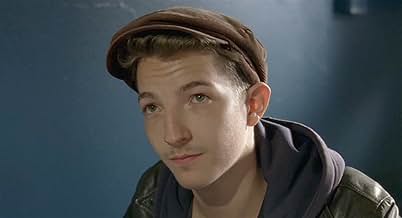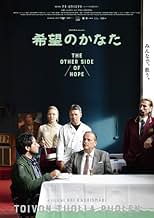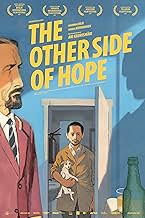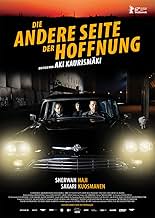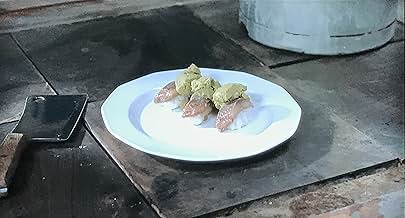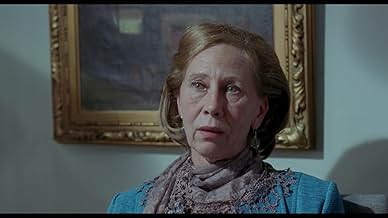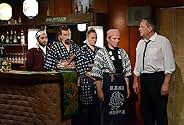CALIFICACIÓN DE IMDb
7.2/10
14 k
TU CALIFICACIÓN
El propietario de un restaurante, jugador de póquer y antiguo agente comercial, hace amistad con un grupo de refugiados recién llegados a Finlandia.El propietario de un restaurante, jugador de póquer y antiguo agente comercial, hace amistad con un grupo de refugiados recién llegados a Finlandia.El propietario de un restaurante, jugador de póquer y antiguo agente comercial, hace amistad con un grupo de refugiados recién llegados a Finlandia.
- Premios
- 8 premios ganados y 24 nominaciones en total
Abdi Jama
- Aseman kassa
- (as Abdi alias 'Lii' Jama)
Simon Al-Bazoon
- Mazdak
- (as Simon Hussein Al-Bazoon)
- Dirección
- Guionista
- Todo el elenco y el equipo
- Producción, taquilla y más en IMDbPro
Opiniones destacadas
In modern-day Helsinki, the lives of two characters are followed: Waldemar (Sakari Kuosmanen) is beginning a new life as a single man and opening a new restaurant; and Khaled (Sherwan Haji) is a refugee from Allepo, Syria seeking asylum in Finland.
This film deserves credit for taking on a subject that continues to grab headlines and personalizes it. The Finns in this movie are mostly portrayed as generous and fair-minded with a few exceptions: some are seen as idiotic government bureaucrats (an international problem), and others are seen as downright nasty thugs (a bigger international problem).
The directing style by Aki Kaurismaki is in his usual style of being deliberately austere and distant with moments of dry humour. It works well mostly but there could have been room for a few moments of deeper emotion considering the subject matter.
A shocking twist at the end does give the film some jolt but the ambiguity of the situation (which is also far-fetched to a degree) is unsatisfying. Despite this, "The Other Side of Hope" is a fine film. As it focuses mostly on Khaled, Haji comes off as a very fine anchor for the movie. - dbamateurcritic
This film deserves credit for taking on a subject that continues to grab headlines and personalizes it. The Finns in this movie are mostly portrayed as generous and fair-minded with a few exceptions: some are seen as idiotic government bureaucrats (an international problem), and others are seen as downright nasty thugs (a bigger international problem).
The directing style by Aki Kaurismaki is in his usual style of being deliberately austere and distant with moments of dry humour. It works well mostly but there could have been room for a few moments of deeper emotion considering the subject matter.
A shocking twist at the end does give the film some jolt but the ambiguity of the situation (which is also far-fetched to a degree) is unsatisfying. Despite this, "The Other Side of Hope" is a fine film. As it focuses mostly on Khaled, Haji comes off as a very fine anchor for the movie. - dbamateurcritic
Aki Kaurismäki's film 'The Other Side of Hope' is really two films in one: the first, a deadly serious look at the life of a Syrain refugee in Finland, and the other, a deadpan comic look at the escapades of an unlikely restauranteur. Oddly, it works, with its direct abutment of light and shade, and its playful treatment of the legendary Finish characteristic of taciturnity. A nice element of the movie is it's use of music as a symbol of our common humanity. It's a simple film, but I liked it.
Remember the pretty boy Ronan Keating singing that you say it best when you say nothing at all? Of course you don't, you only listen to good music. But this could be the very motto of Finnish legendary moviemaker Aki Kaurismäki's latest. This minimalist masterpiece is so achingly simple and elegant and yet so complex in a good way, that there's no really good way to describe it, if you don't understand Kaurismäki's style already. Toivon tuolla puolen" (The Other Side of Hope" in English, Teispool lootust" in Estonian") is like a haiku: it can convey so much with so little words and even so little action. I can't find fitting comparisions here, but Kaurismäki comes across like Jim Jarmusch's less snobish cousin: even more concentrated on what it's like to be human and small things that life is actually made of. They both value storytelling through details but Kaurismäki's approach is more mainstreamfriendly: you don't have to invest yourself fully all the time to make sense of what's going on exactly. Toivon tuolla puolen" offers two bittersweet stories interwining, about refugee in strange and hostile land and old entrepreneur who leaves his wife and finds fresh start in running a diner. It often feels like comedy – Kaurismäki's approach could be called Finnish version of Soviet nostalgia that many 30-year or older viewers will respond to and enjoy. Judging by Estonian premiere, it's a real crowdpleaser. But deeper down it's more about bleak and sad side of human existence: loneliness, being unwanted, trying to find purpose when everything has fallen down. And, of course, about how there's no winning with nowadays' refugee crisis – it brings suffering for everyone involved, except for maybe those who like to attack people who shouldn't be here". I give this quietly hilarious and heartbreaking masterpiece a near- perfect score. Although it doesn't break new grounds for Kaurismäki, I can't think of a way how it could be improved in any meaningful way. The movie's not gonna satisfy everybody, nothing will, but it's almost perfect the way it is. Deceptively simple but powerful experience that you can't imagine getting from anybody else than Kaurismäki.
Most of us have never had a 'refugee experience'. Many have read about it and some take a close interest, but usually it is something that happens to others in distant places. The confusingly labelled comedy-drama The Other Side of Hope (2017)is remarkably effective in bringing the refugee experience right into our face. Once seen, it is hard to regard it as only happening to nameless people in faraway lands.
The narrative frame has a haphazard quality about it, as if the audience has stumbled upon a vantage point from which we can see two hopeless lives randomly collide. After finally walking out on his alcoholic wife, dour Finnish salesman Waldemar (Sakari Kuosmanen) throws the sale proceeds from his business into a high-stakes poker game and makes a small fortune. After buying a run-down restaurant, he encounters Khaled (Sherwan Haji) sheltering among his rubbish bins. The Iraqi refugee had arrived in Helsinki via a coal-cargo ship while fleeing for his life. Refused refugee status and held for deportation by heartless Finnish authorities, Khaled is stateless, friendless, and homeless. Waldemar offers him work and shelter and tries to help him locate his sister who became lost while trying to escape the Syrian Civil War.
The story contains little humour. Its 'comedy-drama' label comes from totally deadpan performances that verge on absurdism, aided by a dark, almost noir filming palette. Most of the sub-titled dialogue is delivered without expression, which emphasises the heartless world into which the refugee is pushed. Dramatic situations that cry out for emotional expression are left cold, and it is this denial of the natural that most hits the viewer. For example, when the Finnish immigration official interviews Khaled for his refugee status, the honesty and sadness of his story are overwhelming yet not a trace of emotion is evident in either interviewer or interviewee. When Khaled is asked what he wants, the depth of his despair is in his words, not their expression: "I do not matter".
An element of the unexpected can add to the enjoyment of a movie, but perhaps not in this case. If you expect an entertaining comedy-drama from a nation well-known for its dark quirky humour you may be disorientated and possibly disappointed. The intention of this film is not to entertain, but to confront, inform, and engage. As global refugee problems continue unabated, The Other Side of Hope does not offer comfort or clarity, and this is reflected in its open-ended conclusion. The film's major achievement is how it makes us look directly into the face of the hopeless and hear the voice of the dispossessed. It leaves a heavy footprint.
The narrative frame has a haphazard quality about it, as if the audience has stumbled upon a vantage point from which we can see two hopeless lives randomly collide. After finally walking out on his alcoholic wife, dour Finnish salesman Waldemar (Sakari Kuosmanen) throws the sale proceeds from his business into a high-stakes poker game and makes a small fortune. After buying a run-down restaurant, he encounters Khaled (Sherwan Haji) sheltering among his rubbish bins. The Iraqi refugee had arrived in Helsinki via a coal-cargo ship while fleeing for his life. Refused refugee status and held for deportation by heartless Finnish authorities, Khaled is stateless, friendless, and homeless. Waldemar offers him work and shelter and tries to help him locate his sister who became lost while trying to escape the Syrian Civil War.
The story contains little humour. Its 'comedy-drama' label comes from totally deadpan performances that verge on absurdism, aided by a dark, almost noir filming palette. Most of the sub-titled dialogue is delivered without expression, which emphasises the heartless world into which the refugee is pushed. Dramatic situations that cry out for emotional expression are left cold, and it is this denial of the natural that most hits the viewer. For example, when the Finnish immigration official interviews Khaled for his refugee status, the honesty and sadness of his story are overwhelming yet not a trace of emotion is evident in either interviewer or interviewee. When Khaled is asked what he wants, the depth of his despair is in his words, not their expression: "I do not matter".
An element of the unexpected can add to the enjoyment of a movie, but perhaps not in this case. If you expect an entertaining comedy-drama from a nation well-known for its dark quirky humour you may be disorientated and possibly disappointed. The intention of this film is not to entertain, but to confront, inform, and engage. As global refugee problems continue unabated, The Other Side of Hope does not offer comfort or clarity, and this is reflected in its open-ended conclusion. The film's major achievement is how it makes us look directly into the face of the hopeless and hear the voice of the dispossessed. It leaves a heavy footprint.
In Aki Kaurismäki's 2016 film TOIVON TUOLLA PUOLEN ("The Other Side of Hope"), the Finnish auteur continues a theme he explored in LE HAVRE from five years earlier: refugees fleeing to Europe and forced to survive when heartless officials and some locals are against them. While that earlier film was shot in the comparatively exotic setting of the eponymous French port, TOIVON TUOLLA PUOLEN returns to Kaurismäki's familiar stomping grounds of downtown Helsinki.
The film consists of two converging plot lines. In one, the aging salesman Wikström (Sakari Kuosmanen, a longtime member of Kaurismäki's acting stable) leaves his wife, wins a lot of money in a poker game, and decides to open a restaurant. In the other, the Syrian refugee Khaled (Sherwan Haji) arrives in Helsinki after fleeing war-torn Aleppo and wandering across half of Europe, but he is worried about his sister that he got separated with along the way. Wikström and Khaled eventually meet and become friends -- or the closest thing to friends that Kaurismäki's exaggeratedly cold and morose Finns can get to each other. Before that, however, the Wikström plot line serves to inject some humour, albeit of an extremely deadpan sort, into a film that, though Khaled, explores the depressing lives of refugees who are shuffled from one center to another and forced to wait for their cases to be processed.
For three decades now, Kaurismäki has made all his films to a very distinctive template that virtually never varies. Its characters speak a minimum of dialogue to each other and show little expression on their faces. The sets are drab in colour and deliberately anachronistic, with gadgets, vehicles or clothes from the 1950s alongside computers and mobile phones from our time. At some point, a band will appear on stage playing oldies rock, blues, or Finnish tangos as the characters look on.
TOIVON TUOLLA PUOLEN doesn't stray from that template either. Still, the script has enough fresh moments to it that it will feel worthwhile even to longtime Kaurismäki films who have sat through this template many times before. Some of the humorous bits are laugh-out-loud funny, but overall this does feel like a darker film than most of the director's work. It is ultimately a choked, restrained cry of rage at the way that refugees are treated, by a Nordic society that prides itself on fairness, equality and charity. While Kaurismäki is roughly on the left politically, several of his films have attacked the Finnish welfare state for its opaque bureaucracy and its reduction of human beings to mere papers in a government file. This film continues that critique by depicting the refugees, who come from many countries but manage to band together to lend each other help, as the sort of neighborly solidarity that Kaurismäki prefers to faceless bureaucracy.
I personally wouldn't find this the best introduction to Kaurismäki. His earlier film MIES VAILLA MENNEISYYTTÄ ("The Man Without a Past") depicted with more meat on its bone a down-on-his-luck man lost among bureaucracy, while the über-idiosyncratic romantic comedy VAROJA PARATIISISSA ("Shadows in Paradise") is one of Kaurismäki's best achievements in deadpan humour. Still, TOIVON TUOLLA PUOLEN seems to tell a story universal enough to pull on everyone's heartstrings and is worth seeing.
The film consists of two converging plot lines. In one, the aging salesman Wikström (Sakari Kuosmanen, a longtime member of Kaurismäki's acting stable) leaves his wife, wins a lot of money in a poker game, and decides to open a restaurant. In the other, the Syrian refugee Khaled (Sherwan Haji) arrives in Helsinki after fleeing war-torn Aleppo and wandering across half of Europe, but he is worried about his sister that he got separated with along the way. Wikström and Khaled eventually meet and become friends -- or the closest thing to friends that Kaurismäki's exaggeratedly cold and morose Finns can get to each other. Before that, however, the Wikström plot line serves to inject some humour, albeit of an extremely deadpan sort, into a film that, though Khaled, explores the depressing lives of refugees who are shuffled from one center to another and forced to wait for their cases to be processed.
For three decades now, Kaurismäki has made all his films to a very distinctive template that virtually never varies. Its characters speak a minimum of dialogue to each other and show little expression on their faces. The sets are drab in colour and deliberately anachronistic, with gadgets, vehicles or clothes from the 1950s alongside computers and mobile phones from our time. At some point, a band will appear on stage playing oldies rock, blues, or Finnish tangos as the characters look on.
TOIVON TUOLLA PUOLEN doesn't stray from that template either. Still, the script has enough fresh moments to it that it will feel worthwhile even to longtime Kaurismäki films who have sat through this template many times before. Some of the humorous bits are laugh-out-loud funny, but overall this does feel like a darker film than most of the director's work. It is ultimately a choked, restrained cry of rage at the way that refugees are treated, by a Nordic society that prides itself on fairness, equality and charity. While Kaurismäki is roughly on the left politically, several of his films have attacked the Finnish welfare state for its opaque bureaucracy and its reduction of human beings to mere papers in a government file. This film continues that critique by depicting the refugees, who come from many countries but manage to band together to lend each other help, as the sort of neighborly solidarity that Kaurismäki prefers to faceless bureaucracy.
I personally wouldn't find this the best introduction to Kaurismäki. His earlier film MIES VAILLA MENNEISYYTTÄ ("The Man Without a Past") depicted with more meat on its bone a down-on-his-luck man lost among bureaucracy, while the über-idiosyncratic romantic comedy VAROJA PARATIISISSA ("Shadows in Paradise") is one of Kaurismäki's best achievements in deadpan humour. Still, TOIVON TUOLLA PUOLEN seems to tell a story universal enough to pull on everyone's heartstrings and is worth seeing.
¿Sabías que…?
- TriviaThe actors playing siblings Khaled and Miriam are real-life siblings.
- ConexionesFeatured in Ismo Haavisto One Man Band: Midnight Man (2017)
- Bandas sonorasOi mutsi, mutsi
Written and performed by Tuomari Nurmio
Selecciones populares
Inicia sesión para calificar y agrega a la lista de videos para obtener recomendaciones personalizadas
- How long is The Other Side of Hope?Con tecnología de Alexa
Detalles
- Fecha de lanzamiento
- Países de origen
- Sitios oficiales
- Idiomas
- También se conoce como
- The Other Side of Hope
- Locaciones de filmación
- Helsinki, Finlandia(The city)
- Productoras
- Ver más créditos de la compañía en IMDbPro
Taquilla
- Presupuesto
- EUR 1,600,000 (estimado)
- Total en EE. UU. y Canadá
- USD 183,943
- Fin de semana de estreno en EE. UU. y Canadá
- USD 15,495
- 3 dic 2017
- Total a nivel mundial
- USD 4,282,973
- Tiempo de ejecución
- 1h 40min(100 min)
- Color
- Mezcla de sonido
- Relación de aspecto
- 1.85 : 1
Contribuir a esta página
Sugiere una edición o agrega el contenido que falta


